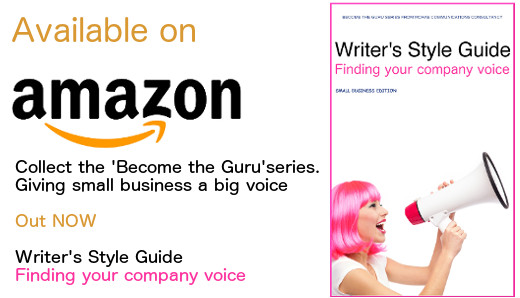If your business has never used the services of a good copywriter, perhaps you’re unsure of the value of paying someone to write words you believe you could write yourself. To help you, as you ponder the merits of engaging the services of a copywriter for your next big project, I’ve put together some serious and some not so serious points to consider.
Copywriters:
- are not afraid of the blank page
This might seem an obvious one to start with but if you’ve ever had that cursor blinking back expectantly at you for hours on end before you type, only to delete, then you type some more before, deep sigh, you delete again, you’ll know how valuable this bravery is.
Even at the most senior level in an organisation, people can be anxious when faced with a blank page. There is no shame in knowing where your strengths lie. In fact it’s an asset. I’ve known excellent C level executives who have ideas brimming left, right and centre, but freeze when it comes to committing their brilliant ideas to paper.
Conversely there are those who don’t know what they want to say until they see a draft in front of them full of all the things they don’t want. Even that, my friend, is a good starting point. Hiring a copywriter means you need never be at a loss for words again.
- are realists
For the aforementioned reason, when hiring a writer, it’s important to manage some expectations here. Banish all notions of the copy being 100% correct first time when you hire the services of a copywriter (and neither will it be perfectly proofread because that is just a waste of time until faced with the final copy).
Don’t be afraid to say to your copywriter this is not what you want. In fact a copywriter will probably look bewildered if you scan through the first draft nodding saying ‘yep looks fine.’ Forget those dramatic tantrum throwing fits you think creatives throw (we generally do that in private). Writers are made of tough stuff and will expect to create three drafts (which an excellent project manager will have factored into the project timeline) – even with a comprehensive brief.
The first draft is normally a brain dump just to get everyone talking – “do you really want to say this?” “is there enough about this?” “can we legally say that?”.
The second draft is a refined version of the first deluge where the real nitty gritty will be discussed. If the planets have aligned in the writer’s favour then perhaps you might scrape through on an early sign off. At this point your writer may still look a little bewildered.
The third version is hopefully where everyone is agreed, happy and ready to sign off. There should be no surprises (from either side) by the time you get to the third draft.
Trying to squeeze this process into a shorter timescale or reduced number of reviews is a false economy that may come back to bite you. Just remember, a copywriter is already saving you time by allowing you to concentrate on the aspects of business that make you shine and your business grow.
- are good at planning
All writers live or die by the deadline. When I first started out in publishing my editor taught me that deadlines wait for no-one (and could potentially cost a publisher significant $$$$$). It was a vital lesson to learn – without having made the mistake in the first place. A writer with a proven track record will NEVER miss a deadline.
On big projects such as a global product launch, where there are many elements to choreograph, weekly meetings are a must and it is during this process (if not before) that a writer will raise their hand to identify a challenge in obtaining information or getting sign off. Tracking people down is often difficult in huge organisations but writers tend to have an inbuilt sense of responsibility so you can be assured it won’t be the writer giving you a nasty surprise a week before launch.
Indeed writers often have to author their own brief in the early stages of a project and will happily work with the project manager to outline how much time each stage of any given process will take (including making room for three rounds of edits, proofreading, QA from the legal team, translations, printing, distribution and so on).
So relax – you can trust your project will be delivered on time when you hire a good copywriter – assuming, of course, the brief doesn’t change half way through (huhem).
- never use open-ended comparative statements
Novice writers tend to use over the top sales language and often rely on comparative statements. “The latest Washing Machine – now even better.” Even better than what? Does that mean the other washing machine was rubbish? Far better to focus on a known issue for users of washing machines. Perhaps energy consumption or water usage or even price – but never just ‘even better’. The benefit to your company is that your communications will be bold, confident and authoritative.
- are skilled professionals in other areas too
Over and above the act of writing, copywriters spend much of their day researching, interviewing, editing, proofreading, managing projects, perhaps even sourcing images and planning and implementing marketing campaigns and such like. However, this point covers what I like to call cross-discipline competency.
A good copywriter is rarely ‘just a writer’ (ie, someone good with words alone). Though many organisations still see the copywriter as a specialist marcomm role, this is just the tip of the iceberg in terms of their skill set. A good copywriter will also have a solid foundation in Marketing and all the elements within the mix. Often, a copywriter has chosen to specialise after a few years in marketing. With this in mind, a good copywriter will be a strategic player in your organisation, with knowledge on the competition, and the competition’s value proposition (for example). Persuasive, winning copy will be written with the competition’s offer in mind – not just great sounding words pulled from the ether. Every word used in the copy will support that positioning. With this in mind it’s important to get copywriters in on a project early on so they can gather all the information they need to be part of that wider marketing conversation. They will also step in with a sanity check if required. Your business will be all the richer for engaging a professional with 360 degree vision, astute marketing expertise as well as having a way with words.
- empathise with your audience’s pain points
As a result of the above, good copywriters appreciate the problems facing your customers. Good copy focuses on the problem (pain points/hot buttons) that your product or service can solve, using an appropriate, empathetic tone. Great copy connects with your audience and communicates ‘value’ without realising they are even being sold a product or service.
- will help you identify your messaging and value propositions
Expect to be quizzed on your hierarchy of messaging. If you don’t know what your key messages are and you don’t know what your value propositions look like, you can trust your copywriter to identify them. Developing a key messaging platform (across all your audiences and regions) is fundamental to targeted and effective communications. Imagine you have a global product release of a medical device. Who is going to be interested? Doctors? Patients? Clinicians? Sales? What countries will it be sold in? What are the main pain points of each of these audiences in each of these countries? How does your product solve their problems (the same product may help solve very different issues for each category). What barriers/resistance might there be to sales? Ultimately the copywriter will need to ascertain these facts to write engaging, relevant copy that will push prospective customers to take action.
- are fearless and bold, they don’t like weak words
Trained copywriters will always write in the active voice and they can smell weakness a mile off. If writing is packed with modifiers and qualifiers, unnecessary adverbs and adjectives it can quickly turn off even the most loyal audience. Lilly-livered words such as ‘very’, ‘really’, ‘just’, ‘like’ or statements such as “I feel” “I think” or “I believe” show a lack of confidence and will be unlikely to ‘persuade’ anyone to buy anything.
Generally speaking, such words do not exist in a copywriter’s vocabulary. That’s good for your business because the voice representing your brand will be strong, confident and competitive and will drive your customers to take immediate action.
- don’t always play by the rules
OK, I admit, I’m trying to make us sound much more exciting that we really are. The point here is a good writer should pride themselves on knowing all the grammar rules and have excellent spelling – just so they know when and how they can break these rules for maximum impact. I’m showing may age here, but my mind always goes back to when Les Dawson used to play the piano – badly. He must have been an excellent pianist to know which note to strike for maximum comedic effect. So full stops in a sub head of an advertising campaign? Leave it out.
- are your friend, your consistent ally
Consistency is one of the most important aspects of any written communication, whether it’s on the company website, an editorial feature or a product brochure. Words or grammatical symbols which appear inconsistently throughout copy gives casts an unprofessional cloud over the image of your company.
Your copywriter is all over this. Where there is chaos they will create order. If there is ambiguity, a good copywriter will create their own style sheet for reference while they are creating your communications. When generating a style sheet for a specific project the writer will take time to ensure it is consistent with other materials created by your organisation. The value of consistency and style guides cannot be over-emphasised. This is your company voice after all – a vital element of your brand.
If you are an organisation that takes your branding seriously, perhaps you already have a Writer’s and Designer’s Style Guide. If there are words that are particular to your industry or company, it makes sense to have these words listed so that any new writer will know how you wish those words to be communicated. If you do not have a Style Guide for your organisation a good writer will be able to help you create this vital resource. Though be warned a good style guide takes time and lots of consultation with stakeholders to ensure buy-in and sign off – particularly in a global organisation.
- have an agenda
True. They have their own voice, their own style, their own agenda and some have their own egos but they leave them behind as soon as they engage with your business. They take on your voice, your agenda and they become the champion for your style and brand. They will never let anyone’s ego get in the way of compelling, effective and targeted copy (even if they have to do some massaging along the way). They are on your team helping you achieve your business goals.
- like chocolate
OK, I just stuck that one in to see if you were still paying attention.
I could wax lyrical about the good work a copywriter will perform on behalf of your business, but hopefully I’ve given you just a taster of their worth and commitment. Now you realise what a gem you have helping you achieve your business goals, go ahead, make your copywriter a coffee and give them a friendly smile at the next meeting. Better still – I meant what I said about chocolate – particularly in the face of a tight deadline or a last minute change to the brief.
If you would like some to learn more about copywriting or any other services McRae Communications Consultancy offers, simply email info@eviemcrae.com or visit our Facebook page to say hi.
 Send to Kindle
Send to Kindle


